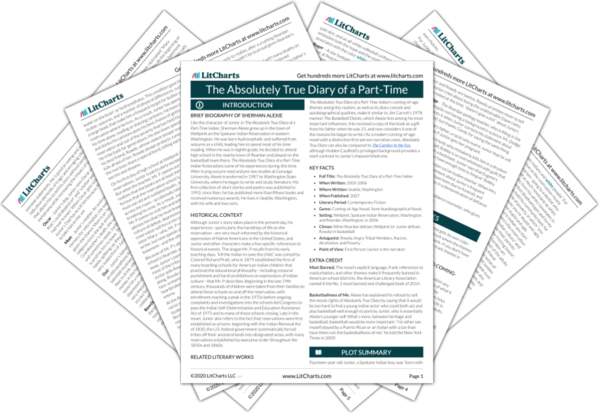“I’m fourteen years old and I’ve been to forty-two funerals,” says Junior after losing three loved ones in alcohol-related accidents. “That’s really the biggest difference between Indians and white people.” For Junior, to be Indian and to live on the reservation means dealing not only with overt racism—going to a dentist who believes Indians only need half as much novocaine as white people do, or facing racist insults from his white classmates in Reardan—but also with the inherited disadvantages and forms of structural oppression that have held his community back for generations. There’s the vicious cycle of poverty, in which “you start believing that you’re poor because you’re stupid and ugly. And then you start believing that you’re stupid and ugly because you’re Indian. And because you’re Indian you start believing you’re destined to be poor.” There’s the reservation school system, originally designed to “kill Indian culture” and now so poorly funded that students must use their parents’ used and outdated textbooks. And there’s “the fricking booze”: the reason, according to Junior, that all Indian families are unhappy, with too many people dying young. Most of the adults in Junior’s life, including his father and his father’s friend Eugene, turn to alcohol as a way of dealing with the sense of despair and defeat brought on by poverty and a racist system that doesn’t “pay attention to their dreams”—and become even further embedded in that system as a result. Alcohol has also been incorporated into Indian traditions such as powwows and wakes, so that ironically, even celebrating the lives of people who have died as a result of alcohol abuse can lead to further heartbreak.
All of these elements contribute to what Junior portrays, and his teacher Mr. P. describes, as a culture of depression, defeat, and hopelessness on the reservation, and they are what Junior tries to escape when he leaves for Reardan. Importantly, while these obstacles shape Junior’s life and circumstances, they aren’t treated as opportunities for character-building—after all, “poverty doesn’t give you strength or teach you about perseverance. No, poverty only teaches you how to be poor.” Rather, they are presented as the simple and brutal realities of Junior’s life, and the lives of all the Indians around him.
Racism, Poverty, and Alcoholism ThemeTracker

Racism, Poverty, and Alcoholism Quotes in The Absolutely True Diary of a Part-Time Indian
I think the world is a series of broken dams and floods, and my cartoons are tiny little lifeboats.

Unlock explanations and citation info for this and every other The Absolutely True Diary of a Part-Time Indian quote.
Plus so much more...
Get LitCharts A+My parents came from poor people who came from poor people who came from poor people, all the way back to the very first poor people.
Adam and Eve covered their privates with fig leaves; the first Indians covered their privates with their tiny hands.
It sucks to be poor, and it sucks to feel that you somehow deserve to be poor. You start believing that you’re poor because you’re stupid and ugly. And then you start believing that you’re stupid and ugly because you’re Indian. And because you’re Indian you start believing you’re destined to be poor. It’s an ugly circle and there’s nothing you can do about it.
Poverty doesn’t give you strength or teach you lessons about perseverance. No, poverty only teaches you how to be poor.
After high school, my sister just froze. Didn’t go to college, didn’t get a job. Didn’t do anything. Kind of sad, I guess.
But she is also beautiful and strong and funny. She is the prettiest and strongest and funniest person who ever spent twenty-three hours a day alone in a basement.
And let me tell you, that old, old, old, decrepit geometry book hit my heart with the force of a nuclear bomb. My hopes and dreams floated up in a mushroom cloud. What do you do when the world has declared nuclear war on you?
“You’ve been fighting since you were born,” he said. “You fought off that brain surgery. You fought off those seizures. You fought off all the drunks and drug addicts. You kept your hope. And now, you have to take your hope and go somewhere where other people have hope.”
“You always thought you were better than me,” he yelled.
“No, no, I don’t think I’m better than anybody. I think I’m worse than everybody else.”
“Why are you leaving?”
“I have to go. I’m going to die if I don’t leave.”
There are all kinds of addicts, I guess. We all have pain. And we all look for ways to make the pain go away.
I mean, the thing is, plenty of Indians have died because they were drunk. And plenty of drunken Indians have killed other drunken Indians.
But my grandmother had never drunk alcohol in her life. Not one drop. That’s the rarest kind of Indian in the world.
Two thousand Indians laughed at the same time. … It was the most glorious noise I’d ever heard.
And I realized that, sure, Indians were drunk and sad and displaced and crazy and mean, but dang, we knew how to laugh.
When it comes to death, we know that laughter and tears are pretty much the same thing.
We had defeated the enemy! We had defeated the champions! We were David who’d thrown a stone into the brain of Goliath!
And then I realized something.
I realized that my team, the Reardan Indians, was Goliath.
Gordy gave me this book by a Russian dude named Tolstoy, who wrote: “Happy families are all alike; every unhappy family is unhappy in its own way.” Well, I hate to argue with a Russian genius, but Tolstoy didn’t know Indians. And he didn’t know that all Indian families are unhappy for the same exact reason: the fricking booze.











